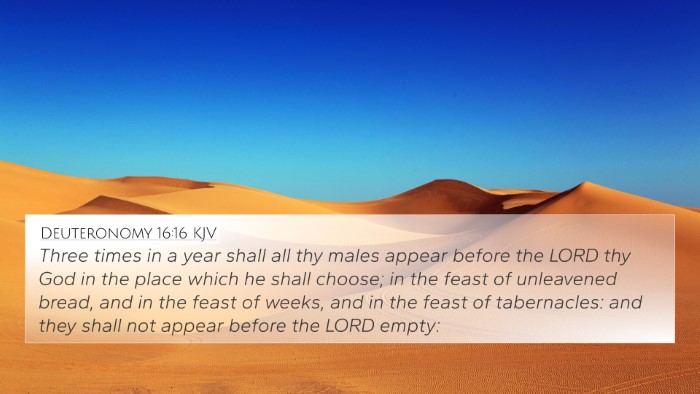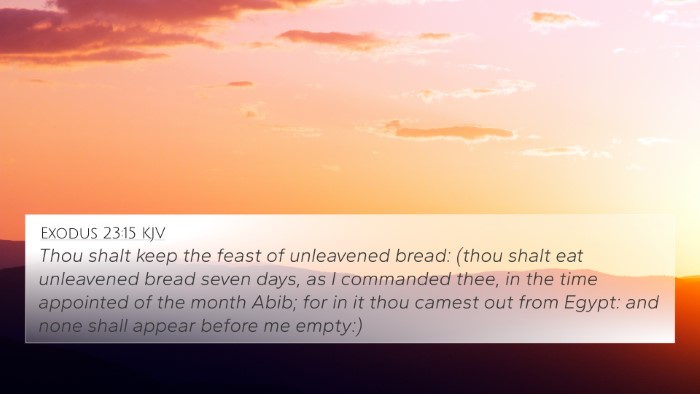Understanding 1 Samuel 6:3
Verse: 1 Samuel 6:3 - "And they said, ‘If you return the ark of the God of Israel, do not send it empty; but by all means return him a trespass offering: then you shall be healed, and it shall be known to you why his hand is not removed from you.’"
Overview
In this verse, the Philistines are instructed on how to return the Ark of the Covenant to Israel. It reflects their recognition of the seriousness of handling sacred objects and their desire to appease God after suffering from His judgment. This acknowledgment leads to a significant moment in the biblical narrative, illustrating both the consequences of sin and the importance of atonement.
Commentary Insights
-
Matthew Henry:
Henry emphasizes the importance of returning the ark with due respect and suggests that acknowledging one's sins is crucial for receiving God's mercy. He notes that the Philistines’ desire to send a trespass offering indicates a developing understanding of God's holiness and their own guilt.
-
Albert Barnes:
Barnes elaborates on the significance of the trespass offering, explaining it as a means of reconciliation. He points out that the Philistines were aware of their wrongdoing and sought to make amends, hinting at a growing reverence for God and the consequences that arise from disrespecting His presence.
-
Adam Clarke:
Clarke highlights the cultural context and suggests that the Philistines were influenced by their understanding of Israelite worship practices. He discusses the necessity of accompanying the ark's return with an offering, signifying recognition of God’s authority and a desire for healing from their afflictions.
Thematic Connections
This verse can be linked to various themes and teachings throughout the Bible, which enriches our understanding of God's nature and our relationship with Him.
Cross-References
- Exodus 30:12 - Instructions on the atonement money, reflecting the concept of making amends.
- Leviticus 5:15-16 - Laws concerning trespass offerings for guilt and reconciliation.
- 1 Samuel 6:5 - The call to recognize God's power, reflecting the consequences of disrespect.
- 2 Samuel 6:6-7 - The story of Uzzah, which underscores the holy nature of the Ark.
- Romans 3:23 - "For all have sinned and fall short of the glory of God," indicating universal guilt.
- 1 Peter 2:24 - The sacrifice that brings healing, paralleling the offering mentioned in 1 Samuel 6:3.
- Isaiah 53:5 - References to healing through suffering, reflecting the leftover implications of God’s judgment.
- Hebrews 9:22 - Without the shedding of blood, there is no remission, reinforcing the importance of offerings.
- Matthew 5:23-24 - The instruction for reconciliation before worship relates to the necessity of atonement in 1 Samuel 6:3.
- Psalm 66:18 - The idea that unconfessed sin can hinder worship, relating to the sentiments of the Philistines.
Applications and Reflections
This verse serves as a reminder of the importance of acknowledging our faults and seeking reconciliation not only with God but also with those we have wronged. Just as the Philistines recognized their need for an offering to appease God, believers today are encouraged to remember the significance of confession and repentance in their spiritual walk.
Tools for Deepening Understanding
For readers wishing to explore the connections between this verse and others, the following tools can be beneficial:
- Bible Concordance: A comprehensive guide to finding scripture references related to themes and concepts.
- Bible Cross-Reference Guide: Tools that provide interconnected scriptures to enhance understanding.
- Cross-Reference Bible Study: Methods that facilitate deeper exploration of interrelated Bible verses.
- Bible Reference Resources: Materials that aid in locating similar passages and developing thematic studies.
- Bible Chain References: Systems that allow for following thematic threads throughout the text.
Conclusion
In understanding 1 Samuel 6:3, we not only uncover the historical context of the Philistines’ response to God but also invite a broader contemplation of guilt, repentance, and the necessity of offerings in our relationship with the divine. This verse resonates through scriptural cross-referencing and emphasizes the importance of how we approach God, reflecting on our sins and the grace that follows acknowledgment and repentance.















